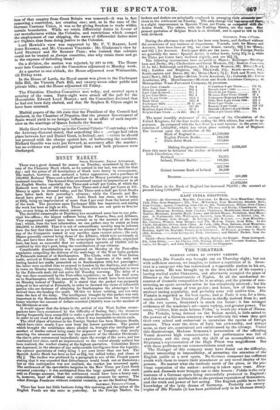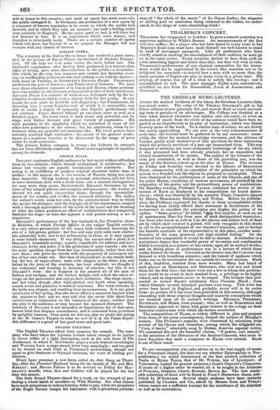THE THEATRES.
GERMAN OPERA AT COVENT GARDEN.
SPONTINI'S Die Vestalin was brought out on Thursday night ; but not with sufficient success, we imagine, to induce a repetition of it. SPOE- TINI is a composer who has maintained a respectable station in his art, but no more. He was brought up in the best school of his country ; having studied under CIMAROSA, and afterwards occupied the place of Director at the Conservatorio of Naples. In all the mechanical re- sources of dramatic composition he is an adept, and the process of con- structing an opera secundum tartan he has completely attained ; but his works want the stamp of true genius ; and hence, few of them have attained lasting popularity, and probably none will outlive him. Die Vestalin is regarded as his best opera; and at Paris it was, for a time, much admired. The libretto of Norma is chiefly derived from it ; and of the two operas, SPONTINfS is much the better : it has stronger evidences of the musician's art—more variety, and greater power. The scene, " Gotter, hart mein heisses Flehn," is worth the whole of Norma.
Die Vestalin, being formed on the Italian model, is little suited to the powers of a German company ; who uniformly fail when they quit their own school and endeavour to naturalize the operas of foreign masters. They wear the dress of Italy but awkwardly, and always seem, as they are, constrained and embarrassed by the attempt. Under this disadvantage, Madame SCHODEL'S personation of the of&nding Vestal deserves high commendation; her performance was full of expression, and she sang with the skill of an accomplished artist. STAUDIGL'S representation of the High Priest was magnificent. But with these performers our commendations must end. The Manager of this company must have found out the difficulty, almost amounting to impossibility, of attracting the attention of the English public to a new opera. No German composer has sufficient credit with them to insure their attendance at any novel display of his powers. No matter what the intrinsic merit of the piece, or the pre- vious reputation of the author nothing is taken upon trust. Eury- anthe and Jessonda were brought out to thin houses : Fidelio is the only instance of a German opera being successfully produced in England ; mid this was mainly attributable to the previous reputation of SCHECROES, and the truth and power of her acting. The English public have little knowledge of the lyric drama of Germany. Probably not twenty opies of Die Vestaliii (it has been published only in its Gertuan dress)
will be found in this country and until an opera has made some stir, the public disregard it. In Germany, the production of a new opera by a composer of known reputation is an event to which the public look forward, and in which they take an interest ; but such a feeling exists very partially in England. Be the opera good or bad, it will have but few hearers at first. It is an experiment which costs money, and therefore is reluctantly made. There are a certain number of operas -which will draw, but beyond th se we suspect the Manager will not venture with any chance of success.
ITALIAN OPERA.
The company at the Italian Opera-house has received a great acces- sion in the person of Signor Pocci, the husband of Madame FREZZO- MEI. Of the lady we took some notice the week before last. The husband's appearance, after having been postponed in a manner that, right or wrong, gave some dissatisfaction to the public—a dissatisfac- tion which, by the way, was ungenerously vented, last Saturday even- ing, on unoffending performers who had nothing to do with the matter— took place on Tuesday, in DoNizerris Lucretia Borgia. FREZZOLINI performed the part of Luerezie, and POGGI that of Gennaro. We have seen these characters represent d by Gitisr and Mmuo, whose perform- ance was neither so effective nor so successful as that of their substitutes. Lucretia Borgia is a monster of wickedness, redeemed only by the in- stinctive tenderness which even a tigress feels for her young. In any hands the part must be horrible and disgusting ; but FREZZOLINI, by throwing into it every feminine trait of which it is susceptible, was able to excite a degree of sympathy that Gatsfs performance did not produce. Poem showed himself an excellent actor as well as a finished singer. His tenor voice is both sweet and powerful, and he sings with Italian fervour, and great variety of expression. His style partakes of the simplicity which we remarked in some of the other new performers of the season ; but his ornaments, when he in- troduces them, are graceful and musician-like. His vocal powers have certainly received high cultivation the extent of his general attain- ments as a musician remains to be discovered by the range of parts which he shall undertake.
The present Italian company is strong ; but hitherto its strength has not been effectively combined. There seems a principle of repulsion among its elements.
FRENCH PLAYS.
DEJAZET captivates English audiences by her esprit without offending them by her audacity, which, though undisguised, is unobtrusive : her talent and vivacity are equally conspicuous and admirable. • Her acting is an exhibition of genuine original character rather than of artifice : in this respect she is the reverse of PLESSY, being less artist than humorist. Owing nothing to personal attractions, and but little to mere histrionic skill, with a shrill voice and a manner distinguished for ease more than grace, Mademoiselle DEJAZET fascinates by the force of her natural powers and complete self-possession : the woman of shrewd wit and quick observation shines through the accomplish- ments of the actress, and vivifies the assumed character. She makes the author's words seem her own, by the conversational way in which she speaks the dialogue ; and the degagee air of her deportment, coupled with a thorough appreciation of the spirit of the scene and the meaning of what she utters, produces an effect of verisimilitude that completely banishes the stage—at least she appears a real person among a set of simulators.
DEJAZET'S performance of the boy-husband in Les Premieres Armes de Richelieu, of which Foreign Affairs is the vulgar English version, is a very clever personation of the saucy little coxcomb assuming the airs of a full-grown gallant : her free and easy style suits male charac- ters admirably well ; and is not unbecoming in them, as it may appear in some female characters. If any thing can excuse such a piece, it is DE.TAZET'S inimitable acting ; equally remarkable for address and non- chalance, levity and point, it is the perfection of quiet comedy; she lets the aside speeches escape from her lips involuntarily, rather than deli- vers them ; and gives the retorts with the pungency of extempore sal- lies of her own ready wit. Her look of discomfiture as she stands hold- ing the box of sugar-plums, mute with chagrin at the bitter jest, and baited by the jeers of the courtiers, has been admired : we thought it too composed, and wanting in intensity of emotion; but this is not DEJAZET'S forte : she is happiest in the assured air of the man of fashion and intrigue, and the wicked delight with which she takes re- venge on her persecutors and enjoys their confusion. She sings nicely ; and her voice, though often high-pitched and harsh when speaking, sounds sweet and plaintive in musical utterance. Her vocal entreaty to the bride was elegant, and touching from its earnestness. It is one great excellence of her acting, that she never affects a sensation beyond what she appears to feel; and we may add that she never falls short from carelessness or inattention to the business of the scene ; neither does she play to the audience, or step beyond the assumed character. The boldness of DEJAZET is not immodest or impertinent, but of that open, honest kind that despises concealment, and is redeemed from grossness by sprightly humour. Thus much we will say, that we prefer her acting at the St. James's Theatre to what we saw of it at the Palais Royal : this difference is a proof of her good sense and good taste.
ENGLISH THEATRES.
The English Theatres afford little occasion for remark. The com- pany who have taken the Lyceum include talent enough to do justice to clever trifles of a light description, such as the new farce of The Enthusiast, in which F. Mal-mews plays a crack-brained craniologist and WALTER LACY a stage-struck lover very amusingly ; and too good to be wasted on such trash as FITZBALL'S melodramas, though not equal to give freshness to Olympic burlettas, for want of leading per- formers.
Drury Lane promises a new farce, called An Attic Story, on Thurs- day, after the Provoked Husband, being for the benefit of Mr. and Mrs. KEELEY ; and Marino Faliero is to be revived on Friday for Mae- READY'S benefit, when Adis and Galatea will be played for the 'last time this season.
The little Strand Theatre closed for a week, on the strength of pro- ducing a whole batch of novelties on Whit Monday. But what chance have such attractions to induce holyday-folks to pay, when the proprietor of the Eagle Tavern tempts bis customers with a gratuitous perform- ance of "the whole of the music" of La Gazza Ladra; the sixpence or shilling paid on admission being returned to the visiter, we under- stand, in the shape of some stimulating drink !



























 Previous page
Previous page